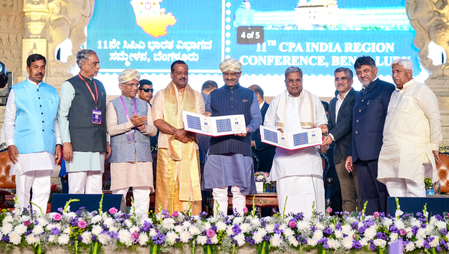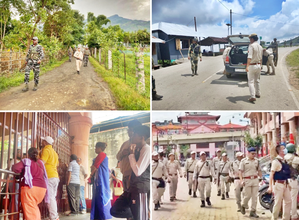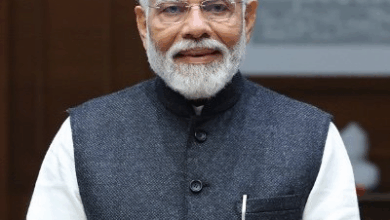Om Birla bats for use of IT, AI in democratic institutions to get closer to people

Bengaluru, Sep 12 : Lok Sabha Speaker Om Birla has stated that the more we utilise Information Technology (IT) and Artificial Intelligence (AI) in our democratic institutions, the closer we become to the people.
The statement has assumed significance in the backdrop of the Karnataka state government deciding to go back to ballot papers instead of EVMs in the local body elections.
He was delivering the inaugural address at the 11th Commonwealth Parliamentary Association India Regional Conference, Karnataka, held at Vidhana Soudha in Bengaluru on Thursday.
Om Birla said, “In this technical age, where we are increasingly using IT and AI, the more we integrate these technologies into our institutions, the closer we get to the people. Our institutions should reach out to the people. Many parliamentary committees within our institutions help us bring the voices of common people to the forefront. Hence, there is a need to imbibe technology into these institutions.”
“In this context, I want to mention that we have made an effort. Our Prime Minister Narendra Modiji had stated at the convention of Presidents of Vidhana Mandals that state Assemblies and Parliament should come together on a single platform. In the form of a digital Parliament, we have tried to bring all proceedings of state Assemblies and the central Parliament onto one platform, through which we can take debates and interactions to the people,” he added.
Since independence, the contribution of this land (Karnataka) to the journey of democracy has been remarkable. The state symbolises both heritage and technology and has become a centre of the country’s progress. We are gathered here to discuss ways to increase people’s trust in democracy, democratic institutions, and the democratic process, he said.
The LS Speaker said, “When the Constitution was being formed after Independence, there were differing opinions and various dimensions of debate in the Constituent Assembly. Despite these oppositions, we managed to frame the Constitution. The democratic heritage of our country was enshrined in the Constitution.”
“I thank Dr B.R. Ambedkar and others who contributed to forming the Constitution. We are proud that India is the world’s largest democracy and has a Constitution that is alive and robust. Even today, it continues to guide us. It is because of the founding fathers of the Constitution that, despite diverse languages, geography, and ideologies, India stands as a strong nation,” he stated.
“It becomes our responsibility to strengthen the roots of our democracy. Differences of opinion are part of our democratic heritage. We stand united, even as differences exist within the Parliament and legislative houses, especially when it comes to matters concerning the nation,” he added.
People’s trust in democratic institutions must increase, and we should ensure transparency in administration. The responsibility lies with the citizens of this country. The strength of Indian democracy lies in the fact that the voice of the common man is heard in the Lok Sabha and Vidhana Sabhas. Our aim is to ensure discussions on important issues concerning the state and the nation, he underlined.
“It is the responsibility of all political parties to uphold the prestige and honour of democratic institutions. Representatives of the people must make these platforms centres of discussion. Politics should not disrupt legislative sessions. However, it has become a matter of concern that discussions are often disrupted,” he stated.
“We are here with the aim of making democratic institutions true centres of discussion. Our responsibility is greater. Over time, we have strengthened democracy. Our democracy is so strong that people around the world have come to trust democratic principles,” he added.
“In this digital age, the place where we are sitting — Bengaluru — is considered a technical hub of the world. Indian youth are leading globally because of their intelligence, technical skills, and scientific capabilities. Karnataka’s Bengaluru plays a major role in this. Whenever I meet technical experts outside India, many of them have studied and started their careers in Bengaluru,” he concluded.
(IANS)






